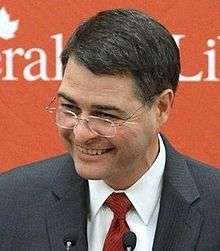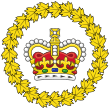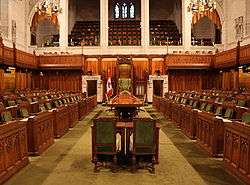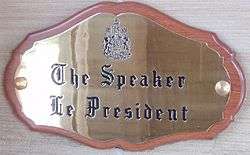Speaker of the House of Commons (Canada)
The Speaker of the House of Commons (French: Président de la Chambre des communes) is the presiding officer of the lower house of the Parliament of Canada and is elected at the beginning of each new parliament by fellow Members of Parliament (MPs). The Speaker's role in presiding over Canada's House of Commons is similar to that of speakers elsewhere in other countries that use the Westminster system. The current Speaker is Anthony Rota. The Speaker with the longest tenure is Peter Milliken who served four consecutive terms in 10 years, 124 days.
| Speaker of the House of Commons | |
|---|---|
 Anthony Rota since December 5, 2019 | |
| Style | The Honourable (while in office as Speaker if not already a member of the Privy Council) Mr/Madam Speaker (In the Commons) |
| Residence | The Farm |
| Appointer | Elected by the members of the House of Commons |
| Term length | Elected at the start of each Parliament |
| Inaugural holder | James Cockburn |
| Salary | $265,968 (2017)[1] |
 |
|---|
| This article is part of a series on the politics and government of Canada |
| Government (structure) |
|
|
|
Legislative (Queen-in-Parliament)
|
|
Judicial (Queen-on-the-Bench)
|
|
Elections
|
|
Local government
|
|
Foreign relations
|
|
Related topics
|
|
Purpose
In Canada it is the Speaker's responsibility to manage the House of Commons and supervise its staff. It is also the Speaker's duty to act as a liaison with the Senate and the Crown. He or she is to rule over the house and have the government answer questions during the question period as well as keep decorum with the house. The Speaker of the House of Commons receives a salary of about $255,300 CAD and has use of a small apartment, in the House of Commons, and an official residence, The Farm, an estate located at Kingsmere in Gatineau Park, Quebec, across the river from Ottawa.[2][3][4][5]
The Speaker is also responsible for the management of the entire House of Commons campus, and the 2,000 individuals who work there.[3] In 2015 Speaker Andrew Scheer managed a budget of $414 million.
The term "Speaker" originates from the British parliamentary tradition. The French term now used in Canada is Président (president, chairperson, or presiding officer); the term Orateur, a calque (literal translation) of "Speaker" and formerly the term used in France for the Speaker of the British House of Commons, was used until a few decades ago.[6] By convention, Speakers are normally addressed in Parliament as "Mister Speaker", for a male, and "Madame Speaker", for a female.
Election


While the Constitution requires that the Speaker be elected by the House of Commons, traditionally this amounted to the rubber-stamp approval of a Member nominated by the Prime Minister.[7] However, in 1986 this was changed and they are now selected by secret ballot. The Speaker remains a sitting MP, but only votes on matters in the case of a tie.
All MPs except for Cabinet ministers and party leaders are eligible to run for the Speakership. Any MP who does not wish to put his or her name forward must issue a letter withdrawing from the ballot by the day before the vote. All MPs who do not remove their name from the ballot as of 6pm the day before the election are listed as candidates on the ballot and are allowed a five-minute speech to persuade their colleagues as to why they should be elected.
The election is presided over by the Dean of the House, currently Louis Plamondon, who is the longest continuously serving MP who is not in Cabinet.
All candidates who receive less than 5% of the vote are removed from the ballot. If no candidate received less than 5% of the vote then the MP with the fewest vote drops off. This continues, with a one-hour break between ballots, until one candidate receives more than 50% of the vote. In the event of a tie on the final ballot, the ballot is taken again. This happened once, in 1993, when Gilbert Parent won over Jean-Robert Gauthier.[8]
The winner is escorted to the Speaker's chair by the Prime Minister and Leader of the Official Opposition. The newly elected Speaker, by tradition, feigns reluctance as he or she is "dragged" to the chair[9] in a practice dating from the days when British Speakers risked execution if the news they reported to the King was displeasing.[10]
On June 2, 2011, Conservative Andrew Scheer (Regina—Qu'Appelle) was elected Speaker, defeating the following MPs over the course of six ballots: New Democrat Denise Savoie (Victoria (electoral district)) and Conservatives Dean Allison (Niagara West—Glanbrook), Barry Devolin (Haliburton—Kawartha Lakes—Brock), Ed Holder (London West), Lee Richardson (Calgary Centre), Bruce Stanton (Simcoe North), and Merv Tweed (Brandon—Souris). Scheer was the youngest Speaker in Canadian history.
On December 2, 2015, Geoff Regan was elected Speaker in a secret ballot by members of the 42nd Parliament over fellow Liberal candidates Denis Paradis, Yasmin Ratansi and Conservative Bruce Stanton.[11] Regan won on the first ballot and is the first speaker from Atlantic Canada in nearly a hundred years[12] since Nova Scotian Edgar Nelson Rhodes in 1922.
Anthony Rota was elected as 37th Speaker of the House of Commons on December 5, 2019, by winning a ranked ballot between himself, Joël Godin, Carol Hughes, Geoff Regan (the Speaker during the previous Parliament), and Bruce Stanton.[13] Following Rota's win, the Conservatives said that he had them to thank for his new election, after they decided in a Conservative caucus meeting to unseat Regan as a show of strength to the Liberal minority government. They did so by ranking Regan further down on the ranked ballot.[14][15]
Opposition Speakers
The Speaker usually comes from among MPs of the governing party. But because he or she cannot vote unless his or her vote would break a tie and by convention must vote to maintain the status quo (which includes voting confidence in the government), a minority government can slightly weaken the opposition's power by electing an opposition speaker.
Speakers have been elected from opposition parties during the 1926 tenure of Arthur Meighen's Conservative ministry, the 1979 ministry of Progressive Conservative Joe Clark, and Stephen Harper's Conservative Ministry from 2006 to 2011. In the 39th Parliament, three opposition members, Peter Milliken, Diane Marleau and Marcel Proulx, ran for Speaker. In 1957, when John George Diefenbaker took power with a minority Progressive Conservative government, he offered the Speaker's chair to Stanley Knowles of the opposition Co-operative Commonwealth Federation (the precursor to the NDP), who declined. So far, every Speaker from an opposition party has been a Liberal.
Impartiality
The Speaker is required to perform his or her office impartially, but does not resign from his or her party membership upon taking office, as is done in the United Kingdom. Speaker Lucien Lamoureux decided to follow the custom of the Speaker of the British House of Commons and ran in the 1968 election as an independent. Both the Liberal Party and the Progressive Conservative Party agreed not to run candidates against him. The New Democratic Party, however, declined to withdraw their candidate. Lamoureux was re-elected and continued to serve as Speaker. However, in the 1972 election, the opposition parties did not come to an agreement and ran candidates against him. Lamoureux was again returned but no subsequent Speakers have repeated his attempt to run as an independent. The opposition parties may have chosen not to follow the 1968 precedent because of how close the election was: it produced a Liberal minority government with just two more seats than the Conservatives.
Tie-breaking votes
On May 19, 2005, the Speaker was required to cast the tie-breaking vote during a confidence measure for the first time in Canadian history. Faced with the defeat of Paul Martin's minority government, Milliken voted in favour of the NDP budget amendment. Despite popular belief that the Speaker, as a Liberal MP, would automatically support the government, his vote was pre-determined by other factors. As Speaker, Milliken's vote must be cast to allow the continuation of debate, or to maintain the status quo, a reflection of Speaker Denison's rule practiced in the British House of Commons. Thus, the Speaker voted in favour of second reading, "to allow the House time for further debate so that it can make its own decision at some future time."[16] The bill would later pass third reading without the need for Milliken's vote.
Speakers have only needed to vote in order to break a tie 11 times in Canadian parliamentary history. Milliken did so on five occasions, more than all previous Speakers combined.[17]
Deputy Speaker
In addition to the Speaker, a Deputy Speaker, also known as the "Chair of Committees" (of the Whole,) is elected at the beginning of each parliament to act in place of the Speaker when the latter is unavailable. Under the Standing Orders, the Speaker, after consulting with each of the party leaders, nominates a candidate for Deputy Speaker to the House, which then votes on that nomination. The Deputy Speaker presides over daily sessions of the House when the Speaker is not in the chair. The Deputy Speaker also chairs the House when it sits as a Committee of the Whole. Other presiding officers, the Deputy Chair of Committees and the Assistant Deputy Chair of Committees, are chosen each session to occupy the chair when the Speaker and Deputy Speaker are not available. The Deputy Speaker and the other presiding officers are members of the Panel of Chairs, and can therefore be selected by the Speaker to chair legislative committees. Like the Speaker, the Deputy Speaker has a role in administering the House.[18]
The current Deputy Speaker is Bruce Stanton (Conservative); and the Assistant Deputy Speaker is Carol Hughes (NDP).[19]
Retirement
Most former Speakers retire from Parliament after their tenure as Speaker, sometimes after returning to the backbench for a period. Several have been appointed to diplomatic positions, summoned to the Senate, or appointed to a vice-regal position such as lieutenant-governor of a province or, in two cases, Governor General of Canada. While several former Cabinet ministers have served as Speaker or stood for the position, no former Speakers have subsequently been appointed to Cabinet. One Speaker, Andrew Scheer, has gone on to assume a front bench position in the House of Commons: Scheer became leader of the Conservative Party of Canada in 2017 and has served as Leader of the Opposition since 2017.
Honorary Speaker
On March 9, 2016 Liberal MP Mauril Bélanger served as honorary Speaker for about an hour to honour his years of service.[20] Speaker Regan resumed his duties for the remainder of the sitting of the House.
Mauril Bélanger was initially the front runner for the current role, but declined due to his being diagnosed with amyotrophic lateral sclerosis. Bélanger died on August 15, 2016, five months after being named honorary Speaker.[20]
Counterparts
The Speaker's counterpart in the upper house is the Speaker of the Senate of Canada. Canadian provincial and territorial legislatures also have Speakers with much the same roles. The position was preceded by the Speaker of the Legislative Assembly of the Province of Canada.
List of Speakers of the House of Commons
Key:
| Speaker | Tenure | Parliament(s) | Term length | Party | Riding | ||
|---|---|---|---|---|---|---|---|
| 1 | James Cockburn | November 6, 1867 | March 5, 1874 | 1st, 2nd | 6 years, 99 days | Conservative | Northumberland West |
| 2 | Timothy Warren Anglin | March 26, 1874 | February 12, 1879 | 3rd | 4 years, 323 days | Liberal | Gloucester |
| 3 | Joseph Godéric Blanchet | February 13, 1879 | February 7, 1883 | 4th | 3 years, 359 days | Liberal-Conservative | Lévis |
| 4 | George Airey Kirkpatrick | February 8, 1883 | July 12, 1887 | 5th, 6th | 4 years, 154 days | Conservative | Frontenac |
| 5 | Joseph-Aldéric Ouimet | July 13, 1887 | July 28, 1891 | 6th, 7th | 4 years, 15 days | Liberal-Conservative | Laval |
| 6 | Peter White | July 29, 1891 | August 18, 1896 | 7th | 5 years, 21 days | Conservative | Renfrew North |
| 7 | James David Edgar | August 19, 1896 | July 31, 1899 | 8th | 2 years, 346 days | Liberal | Ontario West |
| 8 | Thomas Bain | August 1, 1899 | February 5, 1901 | 8th | 1 year, 188 days | Liberal | Wentworth South |
| 9 | Louis Philippe Brodeur | February 6, 1901 | January 18, 1904 | 9th | 2 years, 346 days | Liberal | Rouville |
| 10 | Napoléon Antoine Belcourt | March 10, 1904 | January 10, 1905 | 9th | 306 days | Liberal | Ottawa (City of) |
| 11 | Robert Franklin Sutherland | January 11, 1905 | January 19, 1909 | 10th | 4 years, 0 days | Liberal | Essex North |
| 12 | Charles Marcil | January 20, 1909 | November 14, 1911 | 11th | 2 years, 298 days | Liberal | Bonaventure |
| 13 | Thomas Simpson Sproule | November 15, 1911 | December 2, 1915 | 12th | 4 years, 17 days | Conservative | Grey East |
| 14 | Albert Sévigny | January 12, 1916 | January 7, 1917 | 12th | 361 days | Conservative | Dorchester |
| 15 | Edgar Nelson Rhodes | January 18, 1917 | March 5, 1922 | 12th, 13th | 5 years, 46 days | Conservative | Cumberland |
| 16 | Rodolphe Lemieux | March 8, 1922 | June 2, 1930 | 14th, 15th, 16th | 8 years, 86 days | Liberal | Gaspé |
| 17 | George Black | September 8, 1930 | January 16, 1935 | 17th | 4 years, 130 days | Conservative | Yukon |
| 18 | James Langstaff Bowman | January 17, 1935 | February 5, 1936 | 17th | 1 year, 19 days | Conservative | Dauphin |
| 19 | Pierre-François Casgrain | February 6, 1936 | May 10, 1940 | 18th | 4 years, 94 days | Liberal | Charlevoix-Saguenay |
| 20 | James Allison Glen | May 16, 1940 | September 5, 1945 | 19th | 5 years, 112 days | Liberal | Marquette |
| 21 | Gaspard Fauteux | September 6, 1945 | September 14, 1949 | 20th | 4 years, 69 days | Liberal | St. Mary |
| 22 | William Ross Macdonald | September 15, 1949 | June 11, 1953 | 21st | 3 years, 269 days | Liberal | Brantford |
| 23 | Louis-René Beaudoin | November 12, 1953 | October 13, 1957 | 22nd | 3 years, 335 days | Liberal | Vaudreuil-Soulanges |
| 24 | Roland Michener | October 14, 1957 | September 26, 1962 | 23rd, 24th | 4 years, 347 days | Progressive Conservative | St. Paul's |
| 25 | Marcel Lambert | September 27, 1962 | May 15, 1963 | 25th | 230 days | Progressive Conservative | Edmonton West |
| 26 | Alan Macnaughton | May 16, 1963 | January 17, 1966 | 26th | 2 years, 246 days | Liberal | Mount Royal |
| 27 | Lucien Lamoureux | January 18, 1966 | September 29, 1974 | 27th | 8 years, 253 days | Liberal | Stormont-Dundas |
| 27 | 28th, 29th | Independent | |||||
| 28 | James Jerome | September 30, 1974 | December 14, 1979 | 30th, 31st | 5 years, 75 days | Liberal | Sudbury |
| 29 | Jeanne Sauvé | April 14, 1980 | January 15, 1984 | 32nd | 3 years, 276 days | Liberal | Laval-des-Rapides |
| 30 | Lloyd Francis | January 16, 1984 | November 4, 1984 | 32nd | 293 days | Liberal | Ottawa West |
| 31 | John Bosley | November 5, 1984 | September 29, 1986 | 33rd | 1 year, 328 days | Progressive Conservative | Don Valley West |
| 32 | John Allen Fraser | September 30, 1986 | January 16, 1994 | 33rd, 34th | 7 years, 108 days | Progressive Conservative | Vancouver South |
| 33 | Gilbert Parent | January 17, 1994 | January 28, 2001 | 35th, 36th | 7 years, 11 days | Liberal | Welland—St. Catharines—Thorold Niagara Centre |
| 34 | Peter Milliken | January 29, 2001 | June 2, 2011 | 37th, 38th, 39th, 40th | 10 years, 124 days | Liberal | Kingston and the Islands |
| 35 | Andrew Scheer | June 2, 2011 | December 2, 2015 | 41st | 4 years, 183 days | Conservative | Regina—Qu'Appelle |
| 36 | Geoff Regan | December 3, 2015 | December 5, 2019 | 42nd | 4 years, 2 days | Liberal | Halifax West |
| 37 | Anthony Rota | December 5, 2019 | Present | 43rd | 140 days | Liberal | Nipissing—Timiskaming |
References
- "Indemnities, Salaries and Allowances". Parliament of Canada.
-
"Farewell to Peter Milliken". Ottawa magazine. March 25, 2011. Retrieved December 16, 2018.
There are benefits for the 61-year-old bachelor to being Speaker: he has a small apartment just down the hall from his spacious offices and a grand official residence in Gatineau Park (the Farm), across the Ottawa River in Quebec.
-
Althia Raj (November 27, 2015). "Andrew Scheer, Outgoing House Speaker, Reflects On Pressures, Perks Of Coveted Job". Huffington Post. Retrieved December 16, 2018.
He or she is responsible for the administration of the Commons, the staff, the precinct's security, printing and postal services, and providing MPs funds and resources to do their job — an office that comes with an approximately $414 million budget.
-
"Speaker Geoff Regan opens door to secret apartment in Parliament". Toronto Sun. December 16, 2018. Retrieved December 16, 2018.
One of the best-kept secrets inside the main building on Parliament Hill — known as Centre Block — is what’s inside room 202N.
- Melanie Marquis, Ben Singer (December 16, 2018). "Take a look at the Speakers secret Parliament apartment..." YouTube. Retrieved December 16, 2018.
- "Senators and Members". Retrieved February 4, 2016.
- Brent Holland (October 17, 2014). "Peter Miliken Speaker Of The House Canada Parliament Ottawa Brent Holland Show". YouTube. Retrieved December 16, 2018.
- CPAC. "CPAC". CPAC. Retrieved February 4, 2016.
- "About Parliament: Traditions of Parliament". parliament.co.uk. Retrieved May 16, 2011.
- "Meet Geoff Regan, the new Speaker of the House of Commons". www.cbc.ca. Retrieved December 4, 2015.
- "Geoff Regan elected House Speaker as 42nd Parliament opens". www.cbc.ca. Retrieved December 4, 2015.
- Tunney, Catharine; Zimonjic, Peter; Harris, Kathleen (December 5, 2019). "Liberal MP Anthony Rota elected Speaker of the House of Commons". CBC News. Retrieved December 16, 2019.
- "Liberal MP Anthony Rota elected Speaker. You're welcome, Conservatives say". National Post. December 5, 2019. Retrieved December 6, 2019.
- "Liberal MP Anthony Rota upsets Regan to become Speaker in minority Parliament". Burnaby Now. December 5, 2019. Retrieved December 6, 2019.
- Canadian Press (May 20, 2005). "Speaker's vote breaks first no-confidence tie". theglobeandmail.com. The Globe and Mail Inc. Retrieved November 3, 2015.
- "3,178 days and counting". Archived from the original on October 15, 2009. Retrieved October 13, 2009.
- "The Speaker of the House of Commons". Retrieved February 4, 2016.
- "Speaker and Other Presiding Officers of the 42nd Parliament". Retrieved February 4, 2016.
- The Canadian Press Politics (March 8, 2016). "Mauril Belanger to take Speaker's chair, though ALS has robbed him of speech". Ipolitics.ca. Retrieved July 8, 2017.
External links
- Parliamentary Library of Canada - contains biographies of all of Canada's speakers and information on the historical development and current role of the position.